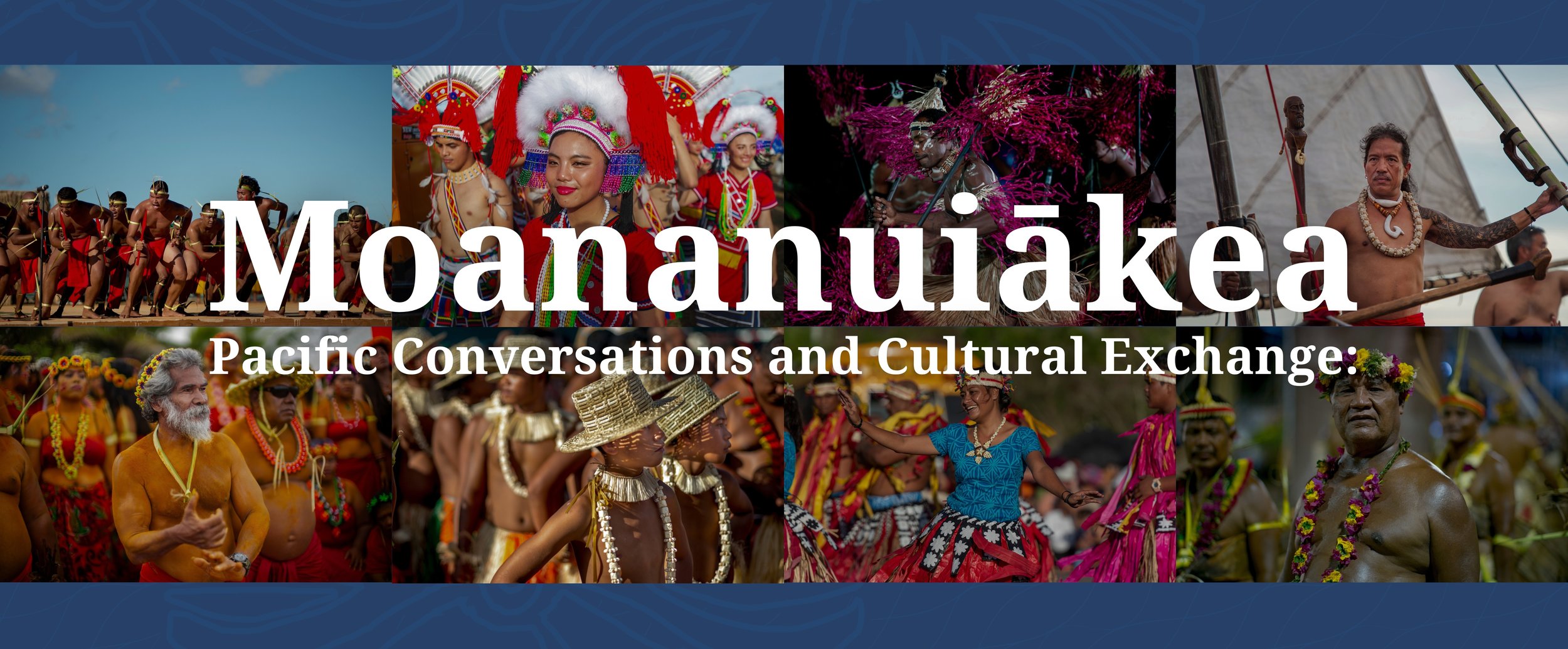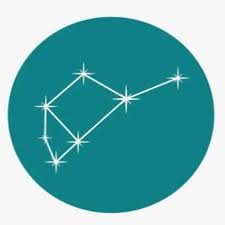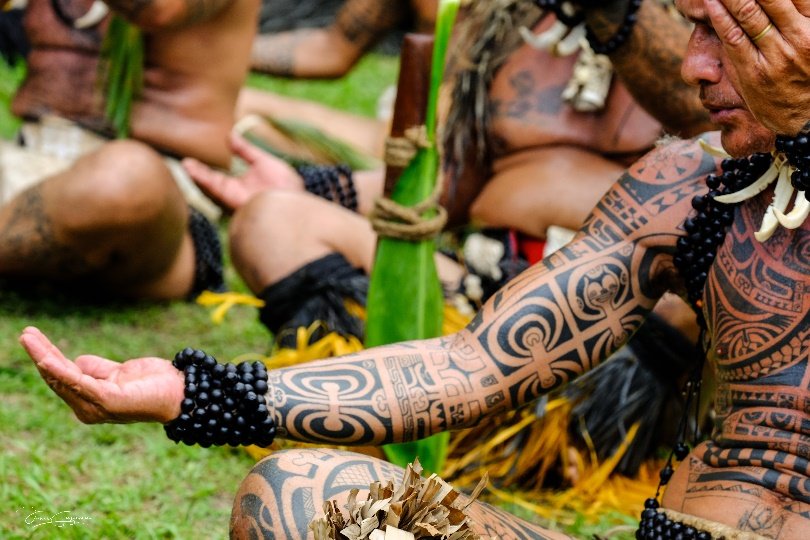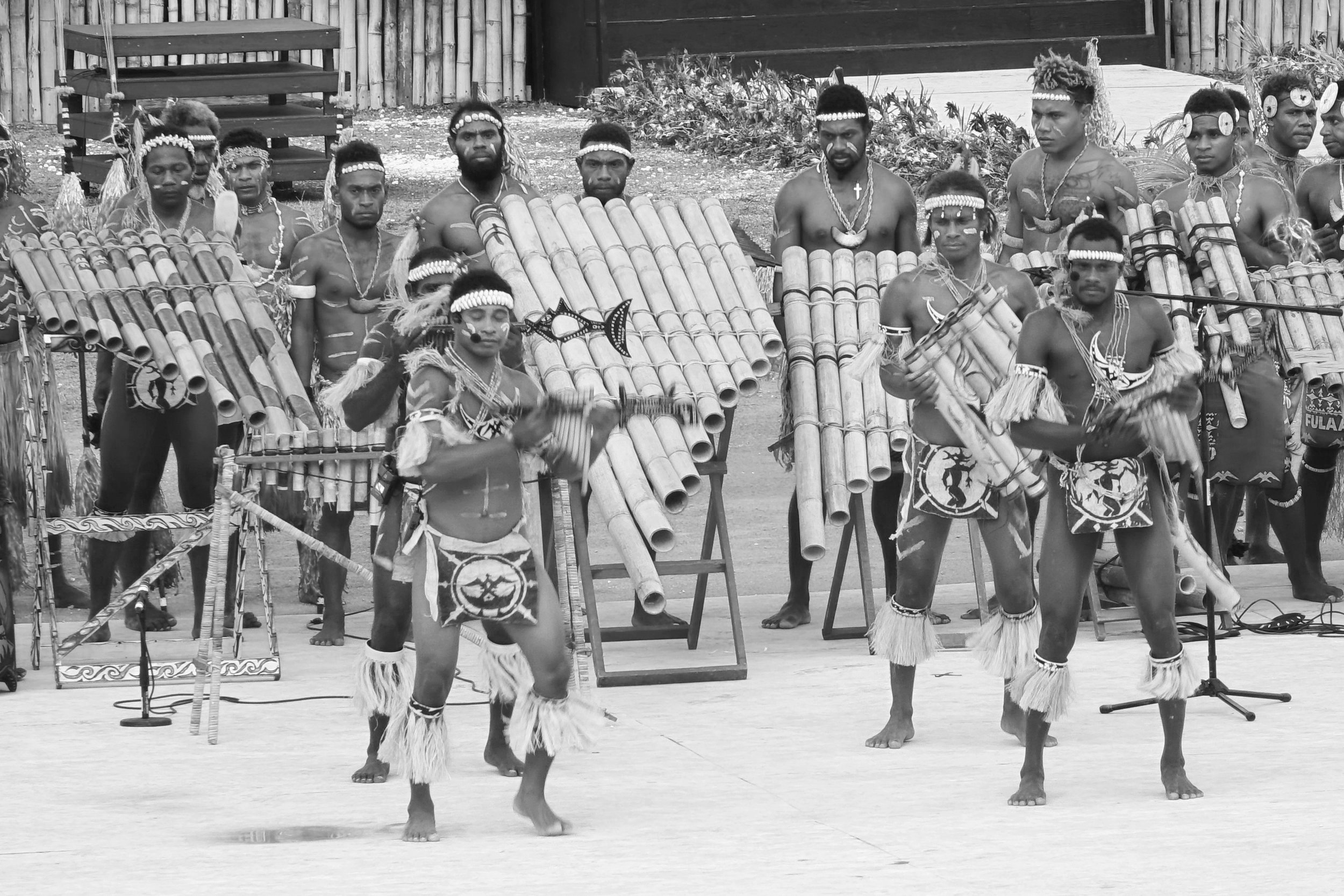
Kalākaua Ballroom B | Level 4
Join us for a 3-day FestPAC Symposium as we engage in important conversations and celebrate our ʻohana from across the Pacific!
SCHEDULE OVERVIEW*
JUNE 11
Ea Moananuiākea: Pacific Sovereignty
Ancestral knowledge, indigenous rights, political activism, self-determination
Kalākaua Ballroom B | Level 4
8:00 AM | Continental Breakfast
8:45 AM | Wehena: Opening Protocol
9:00 AM | Welcome: Welina Moananuiākea
9:15 AM | Keynote: Dr. Jamaica Heolimeleikalani Osorio, “E Mau Ke Ea: Sovereignty, Sanctuary, and Collective Liberation”
10:00 AM | Indigenous Youth Declaration
10:30 AM | Interview: Josh Tatofi – Tongan Heritage, Hawaiʻi Pride
10:50 AM | Pacific Panel: “Tradition-Tourism-Technology” Palau, Tahiti, Australia, Niue
11:40 AM | Morning Recap / “Lahaina Lives On”
11:45 AM | Closing of Plenary
11:50 AM | Youth Declaration Feedback Gallery Walk
12:00 PM | Lunch Break
Rooms 305-307 | Level 3
1:00 PM
Tāonga Puoro: Traditional Māori Musical Instruments
Te Vaʻa e Te Whenua: Support for the “Vaʻa” (canoe) on the “UNESCO Intangible Cultural Heritage” List
Ikanui Teretere Moana: The Whales Come to Us
“O le Solo o le Va: – the Polemic Lay on the Origins of Heaven and Earth – in Samoan and English
2:45 PM
Te Oriori o Te Moana Nui a Kiwa – Traditional Musical Instrumental Connections: 1 of 3 Sessions
Kelp and the Stories of Encounter
Cultural Development and Policy Implementation Achievements of Taiwanʻs Indigenous Peoples
JUNE 12
Moʻolelo Moananuiākea: Pacific Story
Vibrant Pacific stories through song, dance, and games of strength, strategy and skill
Kalākaua Ballroom B | Level 4
8:00 AM | Continental Breakfast
8:45 AM | Wehena: Opening Protocol
9:00 AM | Pacific Dance Exchange “Dancing Across the Islands!” Dance movements from multiple cultures will be taught to female and male groups. All ages welcome.
10:30 AM | Pacific Song Exchange “Bring Your Drums and Guitars!” Music from multiple cultures will be taught en masse, with group sharing, and a string and drum jam session.
12:00 PM | Lunch Break
1:00 PM | Pacific Games/Sports Exchange “Strength, Strategy and Skill” This is an interactive cultural exchange where everyone can join in and play.
Rooms 305-307 | Level 3
2:45 PM
Te Oriori o Te Moana Nui a Kiwa – Traditional Musical Instrumental Connections: 2 of 3 Sessions
Papa Reo – Sovereignty for our Languages & Cultures in a Digital Society
Empowering Pasifika Voices in Cultural Institutions – The Wansolmoana Pasifika Gallery Approach
JUNE 13
Ola Moananuiākea: Pacific Life
Climate change, sea level rise, ocean restoration, impact on ancestral culture, language, and identity
Kalākaua Ballroom B | Level 4
8:00 AM | Continental Breakfast
9:00 AM | Wehena: Opening Protocol
9:15 AM | Pacific Panel: “Rising Seas & Refugees” Kiribati, Tuvalu, Marshalls, Solomons
10:15 AM | Special Performance: “He Kau Heahea a Hiʻiaka” – Dances of Climate Change by Kamehameha Schools Hawaiian Ensemble
10:45 AM | Keynote: “10 Million Navigators” by Pwo Navigator, Nainoa Thompson
11:40 AM | Morning Recap / “Kū Haʻaheo”
11:50 AM | Closing
12:00 PM | Lunch Break
Rooms 304-307 | Level 3
1:00 PM
Tākaro Māori (Traditional Māori Games)
A Convening Conversation About How Community-Led Conservation is Helping Restore Coral Reefs and Sustain Forest Health.
Rongoā (Traditional Māori Healing, Medicine)
Converting the Catwalk – Designers Making Shifts
Protection of the Oceans and Their Resources Through Ancestral Navigation
2:45 PM
Te Oriori o Te Moana Nui a Kiwa – Traditional Musical Instrumental Connections: 3 of 3 Sessions
Haka & Poi (Māori Song & Dance)
Reclamation – Weaving Stewardship Against Tidal Changes
Climate Change Refugees – Rising Waters from Australia
*Schedule subject to change
Liliʻu Theater Performances (Room 310)
Tuesday, June 11
1:00pm | “Flying Fish” by the Yami Tribe, Yayu Elementary School, Orchid Island –Taiwan
2:00pm | “Mohuta: A Dance Drama of Voyaging to New Lands”—Nuku Hiva, Marquesas
3:00pm | Taipa Area School Māori Performing Arts —Aotearoa
4:00pm | “Mintasa Tu Isang” featuring the Bunun Tribe & “The Voices of Malan: Songs Chanted from Traditional Life” by the Amis Tribe —Taiwan
Wednesday, June 12
3:00pm | “First Instruments and Singing the Song Line” —Australia
4:00pm | Ngirchoureng String Band(mandolin, guitar, ʻukulele, bass) —Palau
Thursday, June 13
1:00pm | “Mohuta: A Dance Drama of Voyaging to New Lands”—Nuku Hiva, Marquesas
2:00pm | “Life's Melody Sung in Song"(pa'olic ko 'orip) featuring Chu-Yin of the Amis Tribe —Taiwan
3:00pm | “Peu Tupuna” featuring Lynn Rapu Tuki and the dynamic performers of —Rapa Nui.
Jump To Presentations / Workshops:
Jump To Performances in Liliʻu Theater:
Presentations / Workshops
Tuesday, June 11th
1:00 PM - 2:30 PM
Tāonga Puoro: Traditional Māori Musical Instruments
Room 305A
Aotearoa
Christian McDonald, Ngati Kahu, studied Tāonga Puoro at the University of Waikato under Toti West and has been involved in establishing and empowering students and educators in Tāonga Puoro wānanga (seminars) since 2019 under the guidance of Horomona Horo. Active member of Music Education Aotearoa, he implements wānanga in management spaces to build cultural capability and whakawhanaungatanga (relationship-building)—not possible without a team of expert knowledge holders.
In this session we will explore the demise, renaissance and revival of Tāonga Puoro (traditional Māori instruments), and delve into the whakapapa, misconceptions and healing aspects of Porotiti.
1:00 PM - 2:30 PM
Te Vaʻa e Te Whenua: Support for the “Vaʻa” (canoe) on the “UNESCO Intangible Cultural Heritage” List
Room 305B
Tahiti, French Polynesia
Mr. Heifara Doudoute and Mr. Edgar Teheipauaotaipi Tetahiotupa will share a compelling proposal regarding the “vaʻa” (canoe). The aim is to include the traditional Pacific canoe on the “UNESCO intangible cultural heritage” list.
Come hear about this exciting initiative. Ia fenua ā te vaà, ia vaà ā te fenua, ”May the earth remain a canoe, may the canoe remain earth, forever.” Culture group Haururu performs inspiring Tahitian songs in support of the vaʻa.
1:00 PM - 2:30 PM
Ikanui Teretere Moana: The Whales Come to Us
Room 307A
Aotearoa
Rangi Kipa, Aumakua 2023, parāoa, niho ngutukao, aho (waxed nylon), 305 x 90 mm
Pena Makoare, Rangi Kipa, Ngahina Hohaia, Sian Neutze-Montgomery.
We are a collective of Māori artists whose work expresses our cultural identity through our relationship with Tōhora and Parāoa and gives life to ancient practices shared by our whānau across Te Wheke. At this momentous gathering of Pacific nations, we call for change to domestic and international conventions and legislation that impede the ancient practices of mana ariki across Moana-nui-ā-Kiwa. We also stand in support of He Whakaputanga Moana (Declaration for the Ocean) signed by Kiingi Tuheitia Pōtatau Te Wherowhero VII and Kaumaiti Nui Travel Tou Ariki on 4 April 2023 calling for personhood status for Tohorā as arikinui of our oceans.
This interactive talk will encourage questions and comments from the floor with support from Bonita Bigham co-Head of Delegation for Aotearoa currently engaged in doctoral studies on this subject and based in Hawai’i on a Fullbright Scholarship.
We encourage you to join us during the Festival to share your experiences and aspirations #ikanui
1:00 PM - 2:30 PM
“O le Solo o le Va” – the Polemic Lay on the Origins of Heaven and Earth – in Samoan and English.
Room 307B
American Samoa
Dr. Dan Aga taught Composition & Literature at the American Samoa Community College for many years. His 1987 short story “Between Ocean and Sky” ends with the meditation “…these waves that created the poetry that created Samoa.”
This talk is about using Text, Image, & Music with a little comedy and a very small cast to perform the Samoan Creation myth. How does one stay true to the text of an oral narrative? How does one depict a God that doesn’t look like a Disney cartoon? How does one find the right balance in a bi-lingual performance?
2:45 PM - 4:00 PM
Te Oriori o Te Moana Nui a Kiwa - Traditional Musical Instrumental Connections: 1 OF 3 SESSIONS
Room 305B
Aotearoa
Horomona Horo from the Ngā Puhi, Taranaki and Ngati Porou Iwi is a composer, musician, traditional practitioner, cross genre and arts collaborator. He has fused the traditional instruments of the Māori, taonga pūoro, with a range of cultural, musical, traditional, contemporary and educational forms of creative arts all around the world. Te Oriori o Te Moana Nui a Kiwa will be a series of 3 sessions. Participants can come to one or more of the sessions.
Tuesday, June 11: A presentation of Traditional Musical Instruments of the Pacific, with the gathering and discussions from musicians/players from across the Pacific.
Wednesday, June 12: A workshop to build and work towards a piece of music sharing the natural sounds of the Pacific.
Thursday, June 13: A performance between the participants/artists involved in the workshops for this inaugural gathering of artists.
2:45 PM - 4:00 PM
Kelp and the Stories of Encounter
Room 307A
Australia
Zoe Rimmer discusses the new wave of working with Kelp, and language, while Western institutions still hold her people’s cultural objects captive, they continue to tell a story of ‘encounter’.
Islands mark our Northern and Southern waters. The Island state of Lutruwita/Tasmania has witnessed decades of reclamation where the custodians across homelands were denied their very existence. Their practice & expression of their language - palawa kani, reflects the pristine ancient seas that surround them.
Much of their rikawa (kelp containers) are still held in the British Museum, and the Musée du Quai Branly, Paris were made by Ancestors to hold and carry water, a life sustaining resource and practice. Today, as the only known historic rikawa, they hold and carry Ancestral presences and knowledge.
We imagine who made them; whose hands touched them; who drank from them. We hear the voices and cultural memory of our Old People held within them.
2:45 PM - 4:00 PM
Cultural Development and Policy Implementation Achievements of Taiwan's Indigenous Peoples
Room 307B
Taiwan
Mr. Pasang Kincyang currently serves as Director of Dept. of Education and Culture for Council of Indigenous Peoples of Taiwan. He once served as Secretary General of Indigenous Peoples Department of New Taipei City Government and District Mayor of Wulai District, New Taipei City. Indigenous culture is an important asset of Taiwan. As the central agency for Indigenous policies, the Council of Indigenous Peoples (CIP) is dedicated to promoting and preserving Indigenous cultures.
Through interdepartmental and interdisciplinary collaboration, CIP strives to create environments conducive to the use of Indigenous languages, promote Indigenous education for all citizens, and advance the preservation of Indigenous cultures. In addition to highlighting the unique characteristics of Taiwan's diverse ethnic groups, CIP aims to cultivate public appreciation and respect for cultural diversity. We hope the public will enhance their understanding of Indigenous cultures, fostering a society that values diversity and inclusivity.
Wednesday, June 12th
2:45 PM - 4:00 PM
Te Oriori o Te Moana Nui a Kiwa - Traditional Musical Instrumental Connections: 2 OF 3 SESSIONS
Room 305B
Aotearoa
Horomona Horo from the Ngā Puhi, Taranaki and Ngati Porou Iwi is a composer, musician, traditional practitioner, cross genre and arts collaborator. He has fused the traditional instruments of the Māori, taonga pūoro, with a range of cultural, musical, traditional, contemporary and educational forms of creative arts all around the world. Te Oriori o Te Moana Nui a Kiwa will be a series of 3 sessions. Participants can come to one or more of the sessions.
Tuesday, June 11: A presentation of Traditional Musical Instruments of the Pacific, with the gathering and discussions from musicians/players from across the Pacific.
Wednesday, June 12: A workshop to build and work towards a piece of music sharing the natural sounds of the Pacific.
Thursday, June 13: A performance between the participants/artists involved in the workshops for this inaugural gathering of artists.
2:45 PM - 4:00 PM
Papa Reo - Sovereignty for our Languages & Cultures in a Digital Society
Room 307A
Aotearoa
Te Hiku Media: Peter-Lucas Jones, Suzanne Duncan, and Keoni Mahelona.
In November 2014 when the Hōkūleʻa returned to Aotearoa, Te Hiku Media, a tribal Māori media organization, launched the digital platform Whare Kōrero to livestream the Polynesian Voyaging Society's arrival to Te Tii Marae. With the rise in artificial intelligence and concerns for data sovereignty, the Whare Kōrero was built to provide a safe space to share Māori and Pacific stories in ways that protect the mana and the rights of our data. Today, the Whare Kōrero provides access to news, stories, and performances to audiences around the world. It also serves as the foundation for Papa Reo and a future where Māori will build and control their own AI tools. To ensure our languages and cultures thrive in a digital society, the technologies must speak our languages. To ensure our people thrive in a digital economy, our people must be the curators, creators, and users of the technologies that represent our languages and cultures. Papa Reo is a platform upon which we've built world-leading AI technologies that will empower the next generation of Māori creators and builders.
2:45 PM - 4:00 PM
Empowering Pasifika Voices in Cultural Institutions – The Wansolmoana Pasifika Gallery Approach
Room 307B
Australia/Fiji/Tonga
Melissa Malu is a proud Fijian/Tongan woman and is Head of Pasifika Collections and Engagement at the Australian Museum. As lead curator for the Australian Museum's new permanent Pasifika Gallery, Wansolmoana (one salt ocean) she has been instrumental in growing the museums engagement with Pasifika communities in diaspora and in the Pacific.
The presentation will spotlight the creation of Wansolmoana, the Australian Museum's permanent Pasifika gallery, illustrating how deep engagement with Pasifika communities, elders, artists, and creators led to a groundbreaking shift in museum curation. It will showcase the collaborative process, emphasizing community involvement and the empowerment of Pasifika voices through partnerships. Positive outcomes, such as the revitalization of cultural practices and narratives, and the commissioning of contemporary artworks, demonstrate the impact of this approach in empowering Pasifika cultural knowledge holders. The presentation aims to inspire global cultural institutions to engage respectfully and authentically with communities, fostering meaningful representation and cultural exchange.
Thursday, June 13th
1:00 PM - 2:30 PM
Tākaro Māori (Traditional Māori Games)
Room 304A
Aotearoa
Wiremu Sarich - Te Rarawa Kai Whare, Tatū Roa, is a leading exponent of Ngā Taonga Tākaro - traditional Māori games. He uses fundamental principles of indigenous methodology to activate sensory awareness. Through physical activity, simple instruction and observation he challenges conventional thought to facilitate understanding and connection using the natural environment and Tupuna knowledge. Leading Tākaro specialist in Aotearoa.
Explore the histories and games of Te Ao Maori (Māori world) through the lense of our tamariki. Tupuna (ancestors) visions through the eyes of our mokopuna (future generations).
1:00 PM - 2:30 PM
A Convening Conversation About How Community-Led Conservation is Helping Restore Coral Reefs and Sustain Forest Health.
Room 305A
Hawaiʻi
Join Ulalia Woodside Lee and guests as they discuss how community-led conservation is helping restore coral reefs and maintain forest health to build a future of co-prosperity of ‘āina and kanaka.
Ulalia Woodside Lee, Kumu Hula and Executive Director, The Nature Conservancy, Hawaiʻi and Palmyra. Ekolu Lindsey, President of Maui Cultural Lands, Inc.; Co-founder Polonui Hiu; Vice President Kiuka Olowalu. Keoki Kanakaokai, Natural Resource Manager, Maui Forest Program, The Nature Conservancy, Hawaiʻi and Palmyra. Emily Fielding, Marine Program Director, The Nature Conservancy, Hawaiʻi and Palmyra
1:00 PM - 2:30 PM
Rongoā (Traditional Māori Healing, Medicine)
Room 305B
Aotearoa
Kylie Simeon (Ngati Kahu, Toatoa) is from the Far North of Aotearoa. She was taught by Alison Inch from Toatoa, andhas been weaving and in the Rongoa space for 33 years. She was also taught by Eddie & Atawhai Teneti. Sheʻs been a part of the National Māori weavers of Aotearoa, a member of the Tuia Mara Whenua Rongoā rōpu and proud patched member of Te Rarawa Noho Taiao.
Revive and empower our people around traditional Māori medicines and healing. Explore Te Ao Māori and the power of 3. Learn about various plants and their medicinal uses including: Tupākihi, Kawakawa, Tataramoa, Māmaku, Kūmarahou, and the practice of Tupapakurau (natural preservation of those who have passed on - Whare Tangata).
1:00 PM - 2:30 PM
Converting the Catwalk - Designers Making Shifts
Room 306AB
Australia
Lyllardya Allira Houston, Liandra Gaykamangu Lucy Simpson, Cindy Rostron, Maminydjama Maymuru, Eunice Yu.
Meet the Designers and Models strutting the international runway. Each design and garment is rooted in cultural integrity and sustainable values. First nations art and creativity are transforming design and culture across the Australian fashion industry. Cheekily labelled - the new black.
The story of country is the same, the mediums and expressions have shifted but it’s the telling, that continues to be passed down through the generations. The importance of each work is creating a space in the fashion world where Indigenous art and artists are now recognised, celebrated, and compensated. From working with plant-based dyes and paints, and creating fabrics with locally grown and sourced textiles. The traditions of painting and celebrating country with an eye for colour and texture is now resplendent in the dyeing process and prints on fabric.
Meet our four designers. This growing sector reflects our personal value as women.
1:00 PM - 2:30 PM
Protection of the Oceans and Their Resources Through Ancestral Navigation
Room 307A
Rapa Nui
Famous for its ancestral stone figures (moai), Rapa Nui is home to cultural leaders Maima and Lynn Rapu, the founders of the Ao Tupuna Foundation, a non-profit NGO created and established in Rapa Nui (Easter Island), Chile in 2016.
Their objective is to carry out the rescue of ancient knowledge such as Ancestral Navigation, preservation of the Rapa Nui language, creation of Cultural, Social, Educational and Environmental projects that involve and positively impact our community and the world.
In spite of conservation efforts, the environmental damage has not stopped, perhaps because we cannot reach awareness and an attitude of respect toward nature. Teaching environmental values from infancy is a way of generating change and ensuring that nature is seen and appreciated. Environmental ethics and ecological awareness begin when human beings recognize ourselves as a species, being part of nature, and acknowledging that our actions have an effect on other species.
Thinking from an eco-social and bio-cultural approach, we should integrate social well-being with the conservation of biological and cultural diversity. Ancestral navigation, as our ancestors lived and taught it, helps us understand, relive and apply these concepts from early childhood through adulthood.
2:45 PM - 4:00 PM
Te Oriori o Te Moana Nui a Kiwa - Traditional Musical Instrumental Connections: 3 OF 3 SESSIONS
Room 305B
Aotearoa
Horomona Horo from the Ngā Puhi, Taranaki and Ngati Porou Iwi is a composer, musician, traditional practitioner, cross genre and arts collaborator. He has fused the traditional instruments of the Māori, taonga pūoro, with a range of cultural, musical, traditional, contemporary and educational forms of creative arts all around the world. Te Oriori o Te Moana Nui a Kiwa will be a series of 3 sessions. Participants can come to one or more of the sessions.
Tuesday, June 11: A presentation of Traditional Musical Instruments of the Pacific, with the gathering and discussions from musicians/players from across the Pacific.
Wednesday, June 12: A workshop to build and work towards a piece of music sharing the natural sounds of the Pacific.
Thursday, June 13: A performance between the participants/artists involved in the workshops for this inaugural gathering of artists.
2:45 PM - 4:00 PM
Haka & Poi (Māori Song and Dance)
Room 306AB
Aotearoa
Latoya Graham (Rarawa ki Hokianga, Nga Puhi) was born and bred in Panguru, Hokianga Whakapau Karakia. She is an active member of Te Poutūmārō Kapa Haka rōpu, a traditional Māori performing arts group that makes regular appearances on the bi-annual National Te Matatini stage.
An active member and composer of Te Au Warawara Kapa Haka rōpu, Latoya has been intraditional Māori performing arts from birth. She’s an innovative educator of Te Ao Haka at Te Kura Takiwa o Taipa. In this session, we will explore the histories and learn technique of the poi (a light ball on a string used in traditional dance). We’ll also learn a simple haka (traditional posture dance), and the meaning behind the movements and language.
2:45 PM - 4:00 PM
Reclamation - Weaving Stewardship Against Tidal Changes
Room 307A
Australia
Renowned weavers Freja, Sonja and Elisa Carmichael work with the fishing nets and debris thatiswash up on their shorelines. It’s a family obligation, a blood line responsibility to continue this stewardship.
For years in Queensland much was discouraged and forbade as Aboriginal Lives were controlled by the Aborigines Protection Act. The reclamation of ancient practices and language has seen one small island, known as Minjerribah, find a way to use the enduring traditions of their Quandamooka grandmothers and combine the ancient knowledge of weaving with stewardship for the sea country. The waste that kills their totemic associations and seabeds is being salvaged, crafted as they weave knowledge from the past into hopeful futures, bringing attention to sea pollution and its impact on their shorelines.
2:45 PM - 5:00 PM
Climate Change Refugees – Rising Waters from Australia
Room 307B
Australia
Yessie Mosby, Waniki Maluwapi & Dylan Mooney talk about their campaign.
Our Islands Our homes. Yessie Mosby is a member of The Torres Strait 8, a group of Traditional Owners from Torres Strait Islands taking the Australian government to the Human Rights Committee of the United Nations for its inaction over climate change. They speak about living on the front line, and the stories, the resilience and the action needed to address the rising waters across Australia’s Torres St Islands.
Visionary ancestors such as Chief Bamaga in the 1940s took action by securing land on the Australian Mainland for his Sabai community, due to increasing seawater inundation levels. Now the next generation are taking the Australian Government to the United Nations. Highlighting this global threat that needs world attention.
“We must look after our island, the way it has looked after us. The bosom of this land is our mother, and the water surrounding it is our father. We have to protect them, our islands our home.”
Performances in Liliʻu Theater, Room 310
June 11 | 1:00 PM
Flying Fish by the Yami Tribe (Tao), Lanyu (Orchid Island)
Room 310
Taiwan
"The Flying Fish” was formed in 2006 with children from Yayu Elementary School on Orchid Island, Taitung County, Taiwan. It was established with the aim of expanding the horizons of children on Orchid Island through cultural performances that boost their confidence in their ethnicity and further preserve the traditional culture of the Tao tribe.
The six themes in our performance are: Harvest Song, Beautiful Orchid Island, Millet Harvest Celebration, Hair Dance, Spirit Dance and Canoe Launch Festival. The themes represent the essence of Orchid Island's core values. This is a rare performance outside of Taiwan.
June 11 | 2:00 PM
Mohuta: A Dance Drama of Voyaging to New Lands
Room 310
Nuku Hiva, Marquesas Islands
Aniata Kimitete and Laiza Taea, the directors of the show share that Mohuta is the name of the original tribe that settled on the island of Nuku Hiva according to an old local legend. The showʻs theme is the Matava’a, Te Au ‘I’I Tupuna (the current from the ancestors) represented by their journey to find new land on their vaka. There are 8 dances:
The Vanana: psychological preparation of the people asking the protection of the gods during the vaka construction.
The Ruu: self-introspection of the people on their future journey in their physical preparation.
The Mahau: preparation of the vaka with all the important elements we need to bring (food, knowledge, culture, education, medicine).
The Putu: Navigation starts. The weather is sweet but soon turned. The ocean gets rough and follows a battle between the gods of wind and ocean.
The Hioo: During the night the peace comes back and at dawn appears the silhouette of a bird announcing the approach of land.
The Pipine: The praise of this bird.
The Haka Manu: The land is in sight. Signs of the approaching land are also coming (dolphins, birds, debris, dirt smell…) soon we’ll arrive on shore. People are happy.
The Rikuhi: We arrived on the new land and thank the ancestors for this journey, the traditions and the knowledge they shared so we could cross the ocean safely.
June 11 | 3:00 PM
Te Kura Takiwa o Taipa Kapa Haka (Taipa Area School Māori Performing Arts)
Room 310
Aotearoa
Innovative educator Latoya Graham (Rarawa ki Hokianga, Nga Puhi) was born and bred in Panguru, Hokianga WhakapauKarakia. She is an active member of Te Poutūmārō Kapa Haka rōpu, a traditional Māori performing arts group that makes regular appearances on the bi-annual National Te Matatini stage.
The stories of our tupuna who voyaged to Aotearoa from Hawaikiare featured in seven Kapa Haka: waiata-a-ringa (Action songs), Moteatea (Traditional Maori Chant) Haka, Patu Haka and Poi. Our bracket is called Kupe Ariki representing our ancestral voyaging chief, the revered Kupe.
June 11 | 4:00 PM
“Mintasa Tu Isang” Featuring the Bunun Tribe
Room 310
Taiwan
Led by Dongbuqing, the alliance “tastu baning” unites the five major Bunun youth communities to advance a bridge between the elder and the young generation.
The performance incorporates ancient melodies (including the renowned eight-part harmony “pasibutbut”), children's songs, and forest work songs that emerged after modernization entered the forests.
June 12 | 3:00 PM
“First Instruments and Singing the Song Line”
Room 310
Australia
Steven Pigram, Darren Compton & Joel Nganjmirra & Josh Slypresent an interactive talk and workshop: Yidaki - Boomerang percussion, vocals, and elements of the song line structure. The cultural Mapping, the pathways and the trade routes were always marked in song with rhythm.
Songline lyrics contained important knowledge of creation, navigation, water sources. Repeating the song cycle, lyrics and enacting the dance, cemented both tangible and intangible elements of the story. Giving the songman a full understanding of his environment and the formation of the landscape that shapes us all.
Today our songmen are continuing the language and the connections – it’s a huge commitment and lifelong learning . The Muggera and Injalak dancers made the decision to continue the work of their language guardians, cultural authority’s and tradition holders.
June 12 | 4:00 PM
Ngirchoureng (ŋirʔourəŋ) String Band of Palau (mandolin, guitar, ukulele and bass)
Room 310
Palau
The Ngirchoureng String Band is from the Republic of Palau and plays what some call beches el chelitakl, “new” songs from Palau, which were composed starting in 1915. The Band plays them in the string band style that was popular in Palau in the 1950s and 1960s, and includes mandolin, guitar, ukulele and bass to back up the singers.
Ngirchoureng will deliver a history lesson, describing and demonstrating through song the development and influences of Palauan music from 1915 to 1976.
June 13 | 1:00 PM
Mohuta: A Dance Drama of Voyaging to New Lands
Room 310
Nuku Hiva, Marquesas Islands
Aniata Kimitete and Laiza Taea, the directors of the show share that Mohuta is the name of the original tribe that settled on the island of Nuku Hiva according to an old local legend. The showʻs theme is the Matava’a, Te Au ‘I’I Tupuna (the current from the ancestors) represented by their journey to find new land on their vaka. There are 8 dances:
The Vanana: psychological preparation of the people asking the protection of the gods during the vaka construction.
The Ruu: self-introspection of the people on their future journey in their physical preparation.
The Mahau: preparation of the vaka with all the important elements we need to bring (food, knowledge, culture, education, medicine).
The Putu: Navigation starts. The weather is sweet but soon turned. The ocean gets rough and follows a battle between the gods of wind and ocean.
The Hioo: During the night the peace comes back and at dawn appears the silhouette of a bird announcing the approach of land.
The Pipine: The praise of this bird.
The Haka Manu: The land is in sight. Signs of the approaching land are also coming (dolphins, birds, debris, dirt smell…) soon we’ll arrive on shore. People are happy.
The Rikuhi: We arrived on the new land and thank the ancestors for this journey, the traditions and the knowledge they shared so we could cross the ocean safely.
June 13 | 2:00 PM
“Life's Melody Sung in Song and The Voices of Malan: Songs Chanted from Traditional Life”
Room 310
Taiwan
The Chu-Yin Culture and Arts troupe upholds a 27-year legacy, frequently performing abroad, and is celebrated for its elder members' awe-inspiring polyphonic chanting (macacadaay) recounting the epic history of the Malan tribe.
They will sing about agricultural life and depict scenes of friends gathering and competing in singing after farm work.
June 13 | 3:00 PM
Peu Tupuna
Room 310
Rapa Nui
Led by the highly-respected and talented Lynn Rapu Tuki, Peu Tupuna is composed of various groups and ensembles of Rapa Nui-Easter Island. The Peu Tupuna Cooperative fosters and promotes Rapanui artistic, cultural, gastronomic and heritage manifestations, and protects the rights of Rapa Nui artists and artisans.
Their dynamic performance is exciting and powerful, and not often seen outside of Rapa Nui -- you will not want to miss it.
